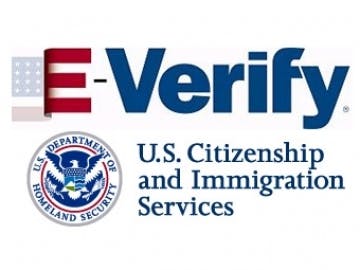By Kim Kiel Thompson
The Public Works Employment Verification Act, signed into law on July 5, 2012, requires all contractors and subcontractors on public-works projects with the State of Pennsylvania (regardless of tier but excluding material suppliers) to use E-Verify for all newly hired employees. The new requirement takes effect on January 1, 2013.
As a precondition of being awarded a contract, contractors and subcontractors must provide a verification form acknowledging compliance to the public agency that awarded the contract. The law prohibits discrimination based on race, ethnicity, color, or national origin, as well as retaliation against an employee who reports a violation or assists in a government investigation.
Penalties for non-ccompliance
A “public work” is defined as construction, reconstruction, demolition, alteration, or repair work – other than maintenance work – paid in whole or in part from public body funds where the estimated cost of the total project is more than $25,000. Work performed under a rehabilitation or manpower training program is excluded from coverage under this law.
The Pennsylvania Department of General Services is tasked with enforcement of the new law and will have the authority to conduct random audits and audits triggered by credible complaints. Penalties for failure to verify an employee through E-Verify include a written warning for the first violation, 30 days debarment from public work contracts for a second violation, and six to 12 months debarment for a third and subsequent violations.
If a court determines that the violation was willful, it may order debarment for three years. Civil money penalties between $250 to $1000 may also be assessed for failure to provide the required verification form.
It will be important for Pennsylvania public works contractors and subcontractors to maintain good records of compliance with the law and ensure that they are trained in the use and legal requirements of the E-Verify system.
This was originally published on Fisher & Phillips’ Legal Alerts. This Legal Alert is intended to provide an overview of an important new law. It is not intended to be, nor should it be construed as, legal advice for any particular fact situation.
